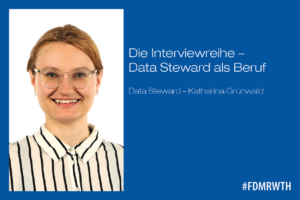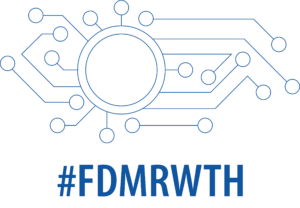The professional field of data stewards is exciting and versatile, which is why we don’t want to deprive our RDM blog readership of the third part of our series “What does a data steward actually do? In this interview, Ms. Katharina Grünwald answers our questions.
Ms Grünwald, please describe your particularly important cornerstones of your previous professional career.
I studied history and art history at the Johannes Gutenberg University in Mainz for my bachelor’s degree and then continued with a master’s degree in public history at the University of Cologne. During my studies, I completed two stays abroad through Erasmus+, one in Estonia and the other in Norway.
After finishing my studies, I started a scientific traineeship at the Landschaftsverband Rheinland in the Cultural Department in the Digital Cultural Heritage Division, where my fields of activity consisted of the digitization of cultural heritage, online editing, and data curation. In March 2022, I started my job as a data steward at the IT Center of RWTH Aachen University. In this, my position is split: I work 50% each in the context of NFDI4Microbiota and NFDI-MatWerk.
What was your motivation to apply as a data steward?
In the traineeship “Digitization of Cultural Heritage” I had the opportunity to get involved with the NFDI consortium “4Objects”. I was immediately interested in the idea of NFDI, because I too had noticed that most research data is stored separately from each other and often poorly described with metadata. So, not a proper library, so to speak, but individual books in different cities without book covers…. Tackling this problem I thought was great. RWTH Aachen University is involved in several NFDI consortia, so I applied here at the end of my traineeship.
Being unfamiliar with the subject is not a problem: in my humanities studies, I learned to keep track of complex issues. Whether I’m dealing with the construct of memory culture or the construct of an infrastructure for research data doesn’t make that much difference. For this reason, I can only encourage humanities students to further their education in this field and apply! 🙂
Can you describe your current tasks as a data steward?
The tasks of a data steward vary from job to job. My focus is on the practical applications from which researchers at RWTH Aachen University and in the NFDI consortium have a direct benefit. For example, the introduction of Electronic Laboratory Notebooks (ELN) or Laboratory Inventory and Management Systems (LIMS). This presents three challenges for laboratories: First, workflows that have been established over years in analog or analog-digital format must now be brought into ELN format. This is a hurdle in addition to the scientific and demanding actual work of the staff. Second, the technical prerequisite is often not given, e.g., there is a lack of tablets in the labs. Third, the research data obtained in the lab must be provided with metadata and made FAIR. Complete digital workflows from generation to documentation in the ELN to analysis and archiving of data does not work without interfaces and linking via PIDs. I forward the findings from these conversion processes to the NFDI.
Another important task as a data steward is networking: I attend weekly meetings for exchange regarding RDM within and outside the NFDI consortia. Through Corona, it was mostly via online meetings in 2022, however, it is transitioning back to more face-to-face contact. Business trips to partner institutions in Germany are also sometimes part of this. In addition, I support the IT service desk regarding inquiries on RDM topics and take over social media activities for NFDI4Microbiota.
What are the particular challenges in the role as a data steward?
For me, splitting the job is a challenge. The NFDI consortia are huge apparatuses that operate throughout Germany with numerous participants. It’s not always easy to maintain an overview, set priorities and divide up time. What’s more, as far as digitization in research institutions is concerned, we’re still pretty much at the beginning. Of course, individual work steps are already being carried out digitally. But standardizing the data so that it follows the FAIR principle will take some time.
Thank you very much for the interview and the exciting insights!
Learn More
Did you like the insight into the profession of a Data Steward? Then feel free to leave a heart! ♥️
If you have any questions about Data Stewards or about RDM in general, simply write a message to the IT-ServiceDesk. The RDM team looks forward to hearing from you.
_______
Responsible for the content of this article are Katharina Grünwald and Lina-Louise Kaulbach.






Leave a Reply
You must be logged in to post a comment.